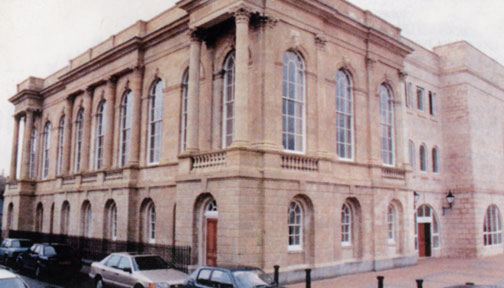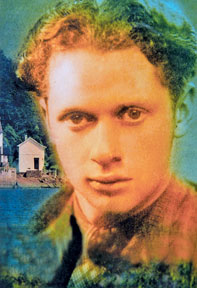Dylan Thomas, The Bard of Wales
By Gwen Heart
He was an exciting, stimulating and compelling writer very often
misunderstood by colleagues as well as critics who failed to dig deeper
into his chequered personality. It was difficult and even impossible to
establish what was true and what was not true about Dylan Thomas. Even
his mother was confused over his birth year and swore he was born in
1915 and not 1914. An outstanding poet but decidedly who never cared
what price may paid for his company because it was very exhilarating but
he was not arrogant. It was just his nature.
 |
|
The Dylan Thomas Centre
in Swasea, South Wales |
There were less disagreement about Dylan as an artist than as an icon
poet. The learned found them to be psychological nonsense but Dylan, in
a short time, was to prove he was as good as William Shakespeare.
Various images created by the media (for their sensational news) such as
him to be that of an outrageous young man, drunken lecher, etc. It was
not fair. He was referred to as wild Welsh boy who roared through a
brief life. But then, it was Dylanís own doings because of the images he
created for himself in his more buoyant moods. He took on the role of
romantic poet doomed to a tragic fate. He estowed his genius upon the
world as a hero laughing in deathís face.
Unfortunately, at the end, no one, not even Dylan knew who the Ďrealí
Dylan was. Was it fiction, fact, legend or lie? Did he pretend to be
sensitive, penniless, misunderstood artist lost and harassed in a
philistine world?
His life pieced together was like the fragments of coloured glass in
a panorama of kaleidoscope; some were brilliant, sparkling colours while
others were dark, sombre and murky. His contradictory impulses and moods
were beyond his control. He found it difficult to unwind himself most of
the time which took him to the most sublime poetry... and back again.
Each time he shook the fragments of his life style they settled on
different patterns, presently bright and joyful, and at other times,
restrained and compulsive. When he wrote under these circumstances
especially in the night, he would wake up in the morning and find them
to be brilliant of which he was unaware when he wrote them. To be more
specific, sometimes he wrote as though in a trance. All the time, he had
tried to fix the pieces into overwhelming colours and form. He was of
extraordinary virtues and equally extraordinary vices but beyond all
these was the total man in full command of truth about life to the
satisfaction and understanding of millions.
Dylan Thomas was the sensitive misunderstood artist whose brief life,
weighed down by his own seekings but who praised the fleeting beauty of
youth and innocence. All these images were nearest to the real Dylan as
he ran through life in the places, the people and the experiences of
Wales that influenced his writings. And in the centre of them all, was
the man himself.
The poet became influenced by his family at a time when names had a
bearing. He was born Dylan Marlais Thomas at 5, Cwmdonkin Drive, Swansea
on October 27, 1914 as the second child of David John Thomas, a local
school teacher and Florence Hannah Williams. Marlais is a tribute to one
of Dylanís great uncles and to the values he represented.
Dylan is a name from ancient Welsh myth and religion from the days
before the dawn of Christianity, from a thousand years before the
English appeared in Britain. Dylan is the son of Arianrhod; she and her
son are those half-human, half-divine figures derived in the tale of
ĎThe Mabinogioní.
Dylanís father was almost the inevitable label of Anglicized Welshman
known as David John and his mother had an English name but they gave
their son names that asserted both their heritage and their hopes that
evoked the mystery of prehistory of the Welsh and their values.
 |
|
The Bard of Wales, Dylan Thomas in his
youth. |
Swansea was the epitome of a city that had straddled several worlds.
English and Welsh were spoken almost equally when Dylan was born. Dylan
entered the Swansea grammar school in 1925 where his father was the
senior English master. Later, Dylan was to claim that he never had a
proper academic record as a result of his own shortcomings and the lax
discipline of the school. However, he excelled in English with his
father reading Shakespeare to him from a very tender age. Dylan started
writings poetry from the age of eight. He started writing poems for the
Grammar School and little works for the school magazine. He went on to
be the editor. He went on to writing professionally with his stories and
with Under Milk Wood.
Apart from writing Dylan was interested in the theatre and performed
at various amature productions at the Swansea Little Theatre. He was
very successful and over exuberant as an actor. His talent stood good
for the later works of the BBC and his reading tours of the United
States. Later he worked for South Wales Daily Post. As he became
popular, he acquired a circle of close friends who were passionate about
art as he was. Among them, Mervyn Levy and Fred James were painters.
Daniel Jones and Tom Werner were musicians. Trevor Hughs and Bert Trick
were writers. These learned people met and discussed their professions
with each other that influenced Dylan to a great extent.
Dylan continued to write and became obsessed by it. From 1930 to
1934, between the ages of 16 to 20, he wrote over 250 poems. He also
wrote short stories and all were published in volumes. The major
subjects that dominated his works were death, life, creativity and
destruction and they are all apparent in his early works. His
preoccupation was death and he often hinted that he did not have long to
live.
He argued life cannot exist without death nor death without life. The
young may have been ignorant of this grim alliance and in Fern Hill, no
one could have escaped this ineluctable fact. Fern Hill is the best
known poem in his first edition.
With years of iconic writing almost in par with his English
counterpart, William Shakespeare, Dylan became his own enemy. His fears
and uncertainty led him to inappropriate behaviour and rise to fear
along with the vicious circle led him to an early death with heavy
drinks and smoking.
A brilliant young life was snuffed out on 9 November, 1953.
|

